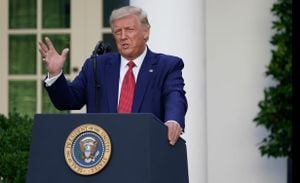The European Union (EU) is gearing up for another round of sanctions targeting Russia's burgeoning shadow fleet of oil tankers. Recent developments have highlighted the bloc's commitment to stifling Russia's oil trade, which has become increasingly reliant on these vessels to circumvent existing sanctions.
This new sanctions package is expected to be approved by the end of the year and aims to impose penalties not only on the tankers themselves but also on individuals connected to these operations. According to sources familiar with the matter, negotiations among the 27 EU member states are currently underway, though securing unanimous approval has been challenging, particularly with Hungary often blocking measures.
Attempts to hinder Russia's oil revenues have intensified over the past few months through multiple rounds of sanctions imposed by the United States, the United Kingdom, and the EU. These sanctions have already identified dozens of tankers and related shipping services involved in moving Russian crude. Notably, countries within the Group of Seven (G7) have restricted the purchase of oil sold above the price cap of $60 per barrel, aiming to undermine Russia's traditional oil market.
These sweeping measures are not merely bureaucratic gestures; they are part of broader efforts by Ukraine’s allies to cut off Moscow's funds derived from its most lucrative export. The sanctions include provisions allowing Western companies to provide transportation, insurance, and services only if the oil transaction meets the price threshold. Otherwise, they face the risk of facing penalties themselves.
Faced with restrictive measures, Moscow devised what is now referred to as the "shadow fleet." This covert operation comprises older, often uninsured tankers with ambiguous ownership, allowing Russia to bypass traditional channels and deliver oil globally. This tactic has generated substantial revenue, which has been funneled directly to support President Vladimir Putin's military activities.
The importance of these measures became even more apparent as discussions unfolded about launching a significantly larger sanctions package early next year. This forthcoming effort could incorporate tighter trade restrictions, potentially targeting Russia’s liquefied natural gas (LNG) sector alongside agricultural exports.
Member states have expressed varying objectives for this package. Some have advocated for more focused sanctions on Russia’s LNG trade, reflecting Europe’s broader goal of reducing reliance on Russian energy supplies. The EU aims to have this plan ready before February 24—the symbolic date marking the third anniversary of the full-scale invasion of Ukraine.
On another front, discussions are occurring within the European Parliament, which has been vocal about proposing limitations on Russian fossil fuel imports entirely. Recently, lawmakers expressed their desire for enhanced surveillance capabilities to effectively identify and track shadow fleet vessels operating outside the EU's purview. Specific proposals from the Parliament include banning oil transfers within EU waters, thereby tightening the noose around the shadow fleet’s operations.
This initiative is moving hand-in-hand with similar actions taken by the UK, which recently reinforced its stance by blocking tankers—no matter their flag—from carrying Russian oil through the English Channel.
Meanwhile, the U.S. government has intensified its focus not only on Russia but also on potential allies enabling these operations. The U.S. Treasury has imposed sanctions on entities aiding Syria’s oil trade with Iran, underscoring the interconnectedness of these geopolitical moves. Bradley T. Smith, the Acting Under Secretary for Terrorism and Financial Intelligence, remarked on the necessity of restricting Iran's ability to fund various destabilizing activities through these illicit trade networks.
The steps taken by the U.S. include targeting the Al-Qatirji Company, which allegedly generates significant revenue for Iranian forces tied to military actions across the region. Such moves function as reminders of the importance of international cooperation to counteract disruptive influences stemming from these complex relationships.
Supporting these initiatives, Panama has legislated measures allowing it to revoke registration and navigation licenses for sanctioned vessels, bolstering global efforts to restrict illicit oil trade networks. This legal adjustment aims to close loopholes currently exploited by vessels plying the oceans without accountability.
With looming deadlines for the adoption of these sanction packages, the EU and its allies are racing against time to fortify their measures against Russia’s shadow fleet. Set against the backdrop of rising tensions and government efforts to maintain pressure on Moscow, the outcome of these negotiations and sanctions could significantly influence the state of energy markets and geopolitics for years to come.
This concerted effort demonstrates not only the resilience of these nations but also their collective aim to impose meaningful consequences on Russia’s aggressive actions. Lawmakers and officials are expected to remain vigilant and proactive as they continue to adapt policies to address the dynamic challenges posed by these ever-evolving energy trade routes and covert operations.



